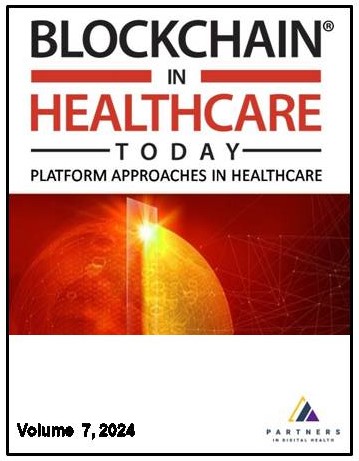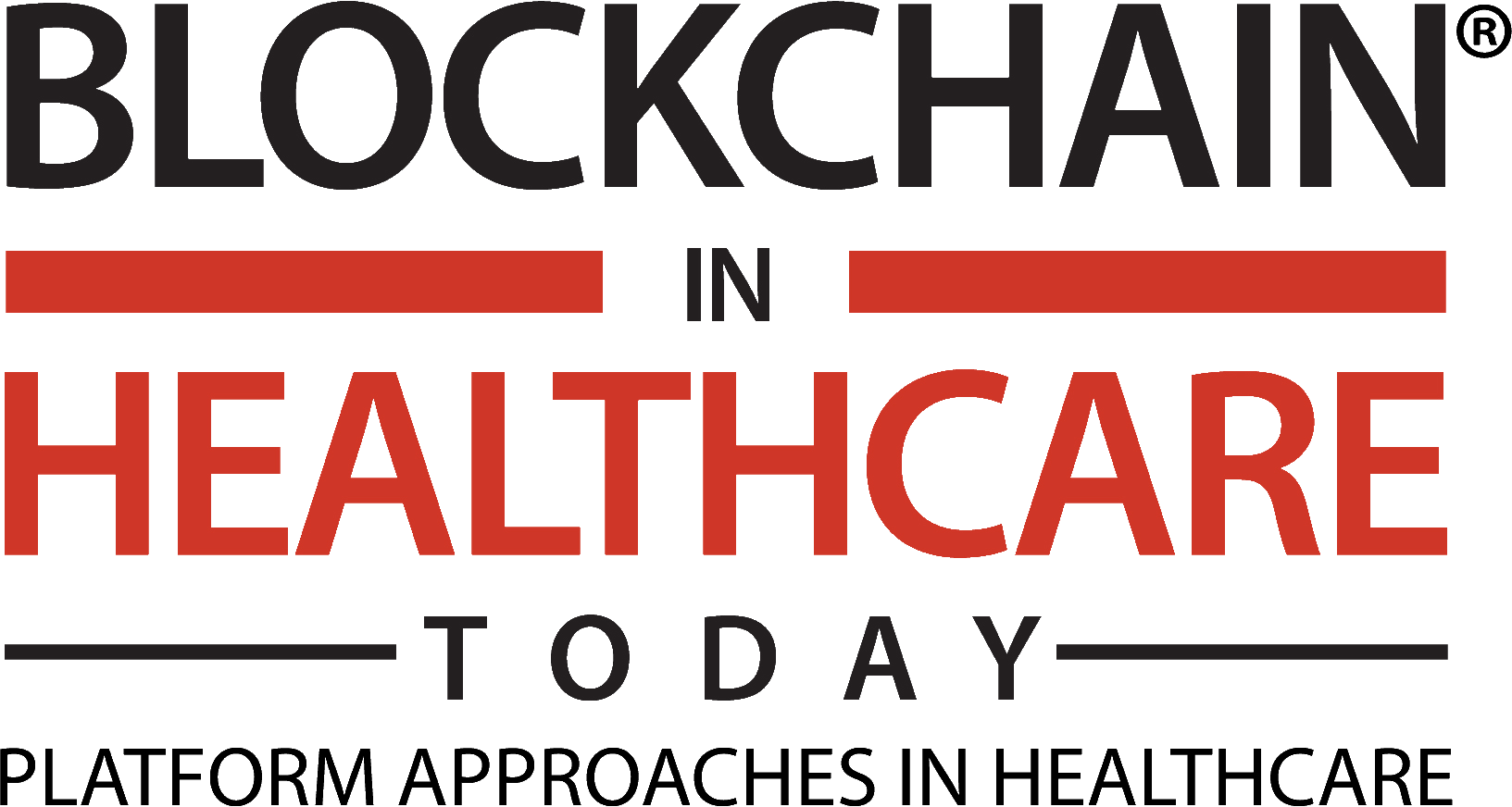Current issue

Volume 7, Issue 3, 2024
Online ISSN: 2573-8240
Volume 7 , Issue 3, (2024)
Published: 16.12.2024.
Open Access
Blockchain in Healthcare Today (BHTY) is the leading international open access journal that amplifies and disseminates platform approaches in healthcare and distributed ledger technology research and innovations. Fields of interest include healthcare information systems, leveraging data science tools and techniques, interoperability, consent mechanisms, privacy preservation, security of health data, clinical trials management, supply chain management, revenue cycle automation, immersive technologies, tokenomics, governance, regulation, network technologies, clinical computing, cryptography, and failed experiments in this expanding specialty field of research.
All issues
Contents
21.04.2024.
Podcast
Blockchain in Health - From Pilots to Mainstream and Implications for AI
Speakers delve into and beyond the previously published BHHTY journal article “Moving Beyond Proof of Concept and Pilots to Mainstream: Discovery and Lessons from Blockchain in Healthcare,” located at https://doi.org/10.30953/bhty.v6.280. This continuous enterprise blockchain technology journey extends the framework and solution assemblies including further developments, with cross over into generative AI and ethics. Objectives Learn specific examples on the economics of blockchain revealing low-hanging fruit for the move from pilots to adoption. Explore concepts such as: Data integrity, minimal data, inter-entity streamlining leading to efficiencies, and what is already possible with tech stack developments and economics in efficiency (in millions) from the previously published BHTY article at DOI: https://doi.org/10.30953/bhty.v6.280 Learn from other verticals to build a framework that is more comprehensive encompassing global perspectives Future proofing and stair-stepping design for an evolving technology – holistic guidance to find and execute the opportunities Obtain a framework for blockchain adoption based on the article. In addition, authors address the academic view of blockchain adoption, and that it is a combination of tech, policy, economics, consumer engagement, and operationalization. Acquire multi-dimensional discovery and specific blockchain constructs including provenance- consensus, trust maps, convergence, dApp human loops, and future proofing /stair-stepping Grasp global perspectives on evolving frameworks with in many verticals and the multi-dimensional nature of blockchain transformation, operationalization, blockchain-enterprise landscape, and AI automation. Gain a better understanding of why is blockchain an essential technology for the future of responsible AI and for scalability of solutions
Sathya Krishnasamy, MS, Badri Gopalakrishnan, PhD, Atul Apte, BSc, MODERATOR: Anjum Khurshid, MD, PhD
20.04.2024.
Conference Presentations
Developing a Secure Internet-based Network of Trusted Data
Our world has not caught up with technology, and as a result has become more dangerous and nefarious with clandestine actors. Learn what reputable organizations, businesses and academic pioneers are doing to preserve digital identity, data provenance, universal access, and secure privacy-preserving transactions, to harness socially responsible global data sharing.
Thomas Hardjono, Florence Hudson
31.01.2024.
Conference Presentations
Highlights from Advancing the Business of Health with Blockchain and Frontier Tech at ConV2X Symposium 2023
Tory Cenaj
16.12.2024.
Editorial
Predictions for 2025: Artificial Intelligence in Modern Drug Development, Quantum Proof Encryption, and Health Data Monetization
We are witnessing an unprecedented convergence of scientific discoveries, technology innovations, exponential adoption of technology and remarkable population demographic shifts towards a digitally native society. The Noble Prizes in medicine, chemistry, physics awarded this year further validated the profound impact of technology on healthcare and life sciences. For 2025-designated by the United Nations as The Year of Quantum Technology, we can envision further technology-driven innovations in all domains, triggering the transition to a novel health ecosystem. The role of AI in modern drug development, the demand for quantum-proof encryption, and the opportunities of blockchain in health data monetization are all trends can be disruptive for pharma, healthcare and healthcare finance.
Ingrid Vasiliu-Feltes MD, EMBA, Jennifer Hinkel, MSc, CHW, FRSA, Olga Kubassova, PhD
16.12.2024.
Special Report: Guidelines, Consensus
Ethics of Blockchain by Design: Guiding a Responsible Future for Healthcare Innovation
The rapid evolution of blockchain technology within healthcare presents unparalleled opportunities for advancements, including enhanced patient data security, decentralized systems for trustless operations, and transparent supply chain management. However, as blockchain reshapes the healthcare landscape, it demands a robust ethical framework that guides its design and implementation. "Ethics of Blockchain by Design" emphasizes embedding ethical principles at the heart of blockchain innovation, fostering public trust, equity, and long-term societal benefits. This paper also proposes a set of best practices guidelines on ethics of blockchain by design.
Muthu Ramachandran
30.04.2024.
Technical Briefs & Reports
Leveraging Decentralized Clinical Trial Management Systems (dCTMS) to Advance Science: Exploring Challenges related to the Diffusion of Innovation and its Execution
Decentralized clinical trials (DCTs) recently gained attention in research necessary for drug development. While the COVID-19 pandemic proved to be a challenging time in this arena, drug development was a critical area of emphasis in the rapid development of vaccines. DCTs were necessary to allow research activities to occur across many locations. Although the use of DCTs play a pivotal role in reshaping healthcare, as technology expands further into the digital space implementation challenges must be considered. A working group of experts assembled, during an interactive learning exercise at the Conv2X conference (2023), to explore challenges related to the diffusion of innovation among key stakeholders. Common “pain points” of technology and an innovative approach that used a blockchain anchored solution were presented. Experts were divided into three stakeholder groups (patients, payers, and pharmaceutical sponsor) which reconvened for an overall discussion. Several themes, that can be supported by blockchain technology, emerged. These include enhanced efficiencies, patient experience / demographic diversity, data integrity / privacy / security, and cost-effectiveness. Future research may focus on additional stakeholder groups that are less familiar with these technological advances and using technology to increase diversity in study populations.
Rama Krishna R Rao
20.04.2024.
Conference Presentations
Data Economy in Healthcare on Blockchain Technology
The importance of data and digitization in healthcare cannot be overstated. These advancements have the potential to revolutionize the way healthcare is delivered, leading to improved patient outcomes, enhanced efficiency, and better decision-making by healthcare providers. Blockchain technology can play a significant role in addressing the main challenges like data accessibility, privacy, interoperability and patient empowerment, ultimately transforming the healthcare ecosystem into a data-driven economy
Kevin Yavuz
31.08.2024.
Original Research
Soulbound Tokens: Enabler for Privacy-Aware and Decentralized Authentication Mechanism in Medical Data Storage
Context: The digitalization of the healthcare sector faces significant challenges due to the diverse representation of data and their distribution across various hospitals. Moreover, security is a key concern as healthcare-related data are subject to the legal obligations of GDPR and similar data protection legislations. Standardization efforts like HL7 have been implemented to enhance data interoperability. However, authentication still remains a critical issue, even significant challenges. Aim: This research aims to improve and strengthen the authentication process by introducing a novel architecture for decentralized authentication. Additionally, it proposes a new approach to decentralized data management, which is crucial for handling sensitive medical data efficiently. Methodology: The proposed architecture adopts a user-centric approach, utilizing Self-Sovereign Identity (SSI). It introduced a new non-fungible token (NFT) type called Soulbound token (SBT) in the medical context, which will facilitate user authentication across different hospitals, effectively creating a federation of interconnected institutions. Results: The implementation of the proposed architecture demonstrated a significant reduction in authentication time across multiple hospitals. The use of SBT ensured secure and seamless user authentication, enhancing overall system interoperability and data security. The decentralized approach also mitigated the risks associated with centralized authentication servers. Conclusion: The study successfully presents a novel decentralized authentication architecture for the healthcare domain, leveraging SSI and SBTs. This approach not only accelerates the authentication process but also enhances data security and interoperability among hospitals. Future research should explore the scalability of this architecture and its application in other sectors requiring stringent data security measures.
Biagio Boi, Franco Cirillo, Marco De Santis, Christian Esposito
31.12.2024.
Original Research
A Secure and Reliable Fog-Enabled Architecture Using Blockchain With Functional Biased Elliptic Curve Cryptography Algorithm for Healthcare Services
Fog computing is an emerging technology that extends the capability and efficiency of cloud computing networks by acting as a bridge among the cloud and the device. Fog devices can process an enormous volume of information locally, are transportable, and can be deployed on a variety of systems. Because of its real-time processing and event reactions, it is ideal for healthcare. With such a wide range of characteristics, new security and privacy concerns arise. Due to the safe transmission, arrival, and access, as well as the availability of medical devices, security creates new issues in the area of healthcare. As an outcome, fog computing necessitates a unique approach to security and privacy metrics, as opposed to standard cloud computing methods. Hence, this paper suggests an effective blockchain depending on secure healthcare services in fog computing. Here the fog nodes gather the information from the medical sensor devices and the data is validated using smart contracts in the blockchain network. We propose a Functional Biased Elliptic Curve Cryptography Algorithm (FB-ECC) to encrypt the data. The optimization is performed using Galactic Bee Colony Optimization Algorithm (GBCOA) to enhance the procedure of encryption. The performance of the suggested methodology is assessed and contrasted with the traditional techniques. It is proved that the combination of fog computing with blockchain has increased the security of data transmission in healthcare services
Charu Awasthi, Satya Prakash, Prashant Kumar Mishra
16.12.2024.
Narrative/Systematic Review/Meta-Analysis
Systematic Review of Usability Factors, Models, and Frameworks with Blockchain Integration for Secure Mobile Health (mHealth) Applications
This systematic review examines critical usability factors that influence the adoption of mobile health (mHealth) applications among older adults and identifies gaps in current usability models, including ISO 9241-11, Nielsen’s heuristics, and PACMAD. This review also explores the potential role of blockchain technology in enhancing multimodal medical data systems within mHealth applications. A comprehensive search across six databases yielded 1,073 studies, with 60 meeting inclusion criteria. Studies were analyzed through thematic synthesis to identify key success factors (RQ1) and comparative analysis to assess limitations in existing frameworks (RQ2). Key factors promoting mHealth adoption included ease of use, efficiency, error prevention, learnability, memorability, and user satisfaction. Blockchain integration emerged as a promising approach to improve data security, interoperability, and user trust, particularly for older adults who engage with complex, multimodal health data. Findings from RQ2 highlighted gaps in usability models, such as the lack of age-specific guidance for multimodal interaction, error recovery, and data privacy. These results underscore the need to define a new usability framework and incorporate blockchain to meet the unique needs of older adults in mHealth applications, supporting both secure and accessible healthcare management.
Irum Feroz, Nadeem Ahmad






